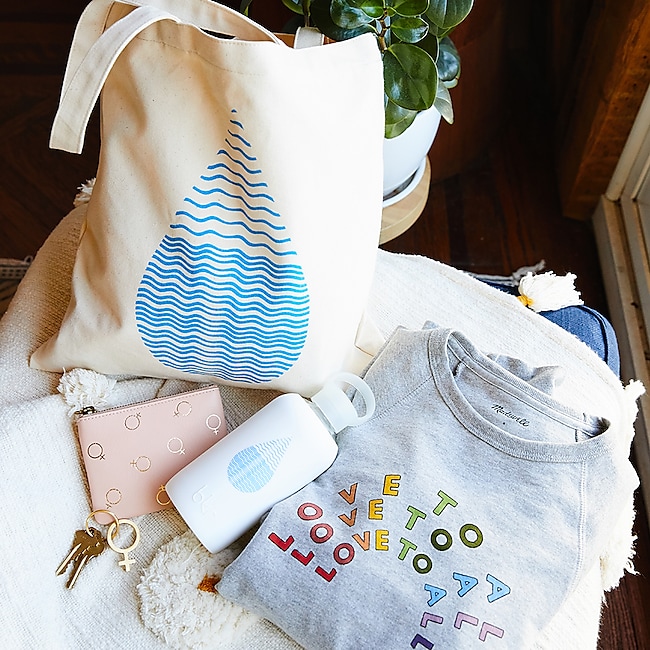A Word From Our Do Well Charity Partners

We believe in doing what we can, when we can to give back. A huge part of that is teaming up with organizations that are committed to making meaningful change—and we’re (very) happy to support them a little extra in celebration of Giving Tuesday. From 11/27–11/29, 100 percent of the retail price from the purchase of special Do Well products will be donated to charity: water, Girls Inc. and the Human Rights Campaign (and 50 percent will continue to be donated after the event ends). Curious about the work our partners do? We asked a representative from each team to share a personal story that sums it up best.
JULIA ANDERSON, DIRECTOR OF BRAND PARTNER STRATEGY AT CHARITY: WATER
“Last year I had the opportunity to travel to Ethiopia with colleagues to meet our local partner on the ground (The Relief Society of Tigray) and visit some of the communities we serve. It was a transformative and humbling experience to say the least. One day, we visited the Sewhi Amuik community in the Ahferom district of Tigray, a community that was going to receive a new clean water point from an upcoming charity: water grant. We saw the dirty pool where people were currently collecting water from, brown and murky with women filling jerry cans, hoisting the 40-pound containers on their backs and trekking back to their homes on the hill.
One family invited us into their home and when I asked the mother what she would do once the new water point was built, she smiled and said that she looked forward to spending more time tending to her house, cooking and cleaning for her family and taking care of the cows and goats they kept in the yard. She seemed relieved knowing that very soon she would no longer have to drink and cook with dirty water. The interaction crystallized why our work is so important and just how catalytic clean water can be.”
PAT DRISCOLL, CHIEF OPERATING OFFICER AT GIRLS INC.
“September 11, 2001. Every afternoon, we sent vans and buses to 18 schools to pick up girls in grades 1 through 5, and that day we had to do the same. We prepped our drivers, monitors and after-school staff to make sure girls would feel safe and maintained our routine to reinforce that the adults were in control. Our main messages once we gathered these younger girls in the daily ‘circle’ were that girls and their families were OK; don’t watch TV when you get home unless it’s with your mom or dad; we are going to be here for you tomorrow and the next day and the next.
Middle-school girls began arriving at the center, full of misinformation and frightened about rumors they had heard. Girls were directed to their own space where they could share. Again, our top priority was for girls to feel safe. But it was appropriate for this age to talk about what they were feeling and for them and the staff who worked with them to try to get whatever information they could.
Our high-school girls were in another building. It was especially hard for them because they had access to TVs, phones, adults, etc. What was particularly difficult was that many of them had come from other countries—countries where they had escaped violence, civil war, gangs and poverty. They thought they’d escaped frightening headlines.
For our girls and our staff, Girls Inc. was what it had always been and has continued to be: a safe, affirming family where girls are treated with respect and love, given information and tools and the space to think things through, try out new opportunities, make mistakes and try again.”
NICOLE COZIER, SENIOR VICE PRESIDENT OF DIVERSITY, EQUITY & INCLUSION AT THE HUMAN RIGHTS CAMPAIGN
“It’s hard to think of a quintessential experience to sum it up because I think this work manifests in so many different ways. It is the connection and relationship with people who move through the world with multiple marginalized identities, who trust me and my team with their voice and their stories, who trust that we will take them with us into every room and every table that we sit at.
It is the conversations with people who are on their own learning journeys, discovering their privilege, understanding oppression around experiences not their own and wanting to know how to lean in for themselves, their colleagues and our communities. It is about raising the complex questions about intersectionality and creating the space to explore the answers in a different way than we have before. It is about the hard conversations when we are not being all that we can be for the communities that depend on us.
Finally, it is about the moments when all of that work comes together to make meaningful impact on hearts and minds, programs, policy and practice that speaks to the multiplicity of lived experiences in our community.”
Thanks for sharing, everyone. Learn more about our Do Well partners here and check out the special collection here.



